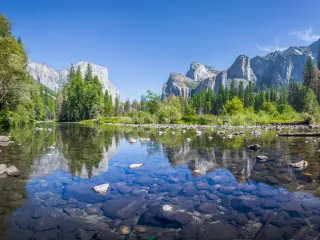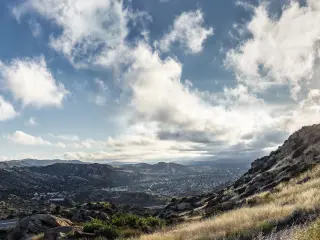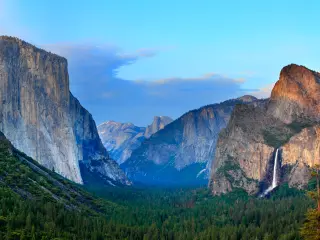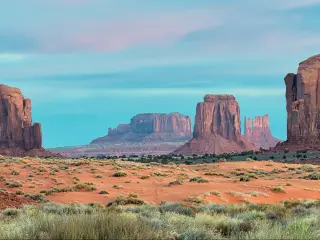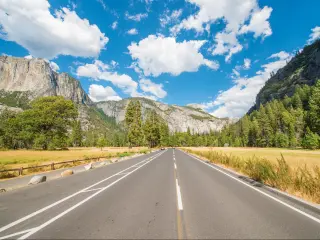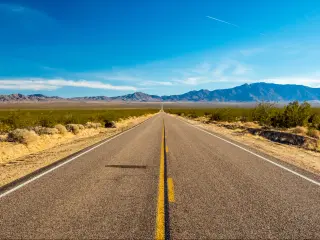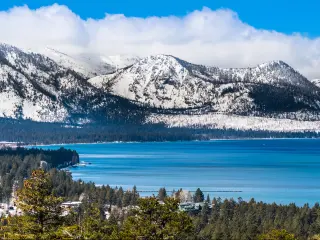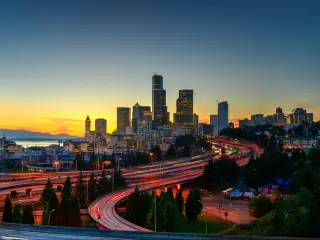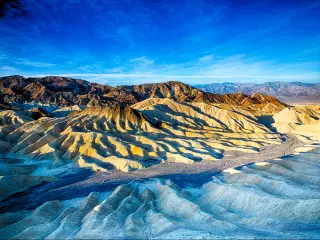The Best Yosemite Photo Spots: Our Complete Guide (with map!)
Nestled within California's Sierra Nevada Mountain Range, Yosemite National Park is a true visual feast. The granite peaks and alpine valleys are bordered by national forests and whether you're seeking out vibrant green meadows, bursts of wildflower color or dramatic snowy scenery, this constantly changing landscape has something to offer visitors all through the year.
With its stunning natural landscapes, Yosemite National Park is a photographer's dream. We've collated 20 of the park's most spectacular photo opportunities, encompassing rugged cliffs, mountain views, cascading waterfalls and giant sequoia trees.
As well as the chance to hone your photography skills or create an unforgettable grid for your socials, you can enjoy hiking, biking, rock climbing and rafting on a visit to Yosemite. Or stay after dark for a mesmerizing stargazing experience.
| Photo Spot | Description |
|---|---|
| 1. Glacier Point | A breathtaking panorama of Yosemite Valley, Half Dome, and the High Sierra, offering one of the best comprehensive views |
| 2. Tunnel View | A classic Yosemite vista that showcases El Capitan, Bridalveil Fall, and the back of Half Dome through the lens of a road tunnel |
| 3. El Capitan | The granite monolith towering 3,000 feet above Yosemite Valley, showcasing nature's majesty and a magnet for photographers |
| 4. Bridalveil Fall | A striking waterfall flowing like a bride's veil, especially picturesque in spring when it's at its fullest |
| 5. Tenaya Lake | A pristine alpine lake framed by granite domes and pine forests, reflecting the Sierra skies |
| 6. Half Dome | Yosemite's iconic granite dome, known for its sheer face and unique shape, offering breathtaking views and photo ops |
| 7. Yosemite Falls | The tallest waterfall in North America, cascading in three tiers, making it a dramatic photo spot |
| 8. Tuolumne Meadows | A vast, subalpine meadow surrounded by granite peaks, a serene landscape teeming with wildlife |
| 9. Taft Point | A cliff's edge with an unobstructed view of Yosemite Valley below, where fissures in the rock add drama to the foreground |
| 10. Valley View | A riverside vista capturing the Merced River's reflections of El Capitan and Bridalveil Fall |
| 11. Yosemite Chapel | A historic chapel set against the backdrop of Yosemite's beauty, illustrating the peaceful harmony of the area |
| 12. Nevada and Vernal Falls | A duo of cascading waterfalls along the Mist Trail, each with its own distinct character and beauty |
| 13. Sentinel Bridge | Known for its reflections of Half Dome in the Merced River, especially stunning during golden hour |
| 14. Inspiration Point | An elevated viewpoint offering a less-crowded perspective of Yosemite Valley's iconic landmarks |
| 15. Cook's Meadow | A serene grassy expanse providing unobstructed views of Yosemite's granite giants and seasonal wildflowers |
| 16. Clouds Rest | A high elevation viewpoint offering sweeping vistas of Yosemite Valley and surrounding peaks |
| 17. Eagle Peak | The highest point of the Three Brothers formation, giving hikers panoramic views of Yosemite Valley |
| 18. Mirror Lake | A seasonal lake offering reflective views of Half Dome and surrounding cliffs, especially tranquil in early mornings |
| 19. Olmstead Point | Provides unique perspectives of the backside of Half Dome, the surrounding granite formations and erratic boulders |
| 20. Mariposa Grove | Home to over 500 mature giant sequoias, where ancient trees reach skyward, speaking to the agelessness of nature |
Please see the map below to see where our photo spots fall in Yosemite National Park:
To visit any of the stunning photo spots inside Yosemite National Park, don't forget that you'll have to pay the park entrance fee of $35. You can pay at any of the entrance stations or splash out on an annual America the Beautiful Pass and use it to enjoy a whole year of scenic adventures!
1. Glacier Point
What makes this photo spot special: This amazing overlook offers panoramic views of the Yosemite Valley. From here you can see the Half Dome, Yosemite Falls, and the High Sierra peaks.
That means it's the perfect place to photograph the landscape before heading further through the national park for some close up views.

How to get there: Enter the park at the South Entrance along CA-41 then follow Wawona Road. After 17 miles you'll reach the right turn onto Glacier Point Road.
Best time to visit: Glacier Point Road is only open from late Spring to early Fall. If you want to get here in winter then be prepared for a strenuous 10.5-mile cross-country ski!
In the warmer months, this is a viewpoint that has something to offer all through the day. Sunrise casts a soft yet warm light on the granite cliffs, while the sun setting behind the mountains lights the Half Dome beautifully at the end of the day.
The lack of light pollution and the high vantage point makes this a great place to photograph the stars after sunset.
Where to park: Park at the end of Glacier Point Road to enjoy this magnificent view.
2. Tunnel View
What makes this photo spot special: The easy access from Wawona Road makes this a popular spot. When you reach Tunnel View you can gaze down the forested Yosemite Valley, with its imposing granite walls.

How to get there: Enter the park through the South Entrance, from where you'll continue on Wawona Road, otherwise known as Highway 41. Drive for around 25 miles and after passing through the Wawona Tunnel, you'll reach Tunnel View.
Best time to visit: Tunnel View is best visited at sunrise and sunset since the bright light during the day can sometimes be too harsh for great photographs. On the other hand, at sunrise and sunset, the low sun offers smoother light.
If you're trying to decide what time of year to visit, this part of Yosemite is beautiful in late spring and early summer. The valley is greener at this time of year, plus Bridalveil Falls is in full flow after the ice has melted.
Where to park: After you drive through the Wawona Tunnel, you'll find roadside parking on the left.
3. El Capitan
What makes this photo spot special: Rising nearly 3,000 feet from Yosemite Valley, El Capitan is one of the world's largest granite monoliths. It's an unforgettable natural monument that's understandably popular with rock climbers as well as photographers.

How to get there: To photograph El Capitan, it's best to go to El Capitan Meadow. This is accessible from both the South Entrance and Arch Rock Entrance, but it's a shorter drive if you start from the Arch Rock Entrance.
On entering Yosemite at Arch Rock Entrance, follow El Portal Road for 5.5 miles then continue on Southside Drive until you reach the left turn onto El Capitan Drive.
Best time to visit: Come to El Capitan in the morning since the soft light after sunrise creates a glow on El Capitan. You have more chance of mist or low clouds early in the day too, to create further atmospherics.
While El Capitan is an impressive sight all year round, visit in spring to juxtapose the rugged granite rock with the blooming wildflowers in the meadow.
Where to park: After crossing the Merced River on El Capitan Drive, use the limited parking on the side of the road.
4. Bridalveil Fall
Note: The trail to Bridalveil Fall is closed due to the Bridalveil Fall Rehabilitation Project. Please check the official website before you visit for up-to-date information.What makes this photo spot special: Known for its grace, the delicate cascade earned its name for its resemblance to a bridal veil. Unlike other falls in Yosemite, it's easily accessible from a paved hiking trail.
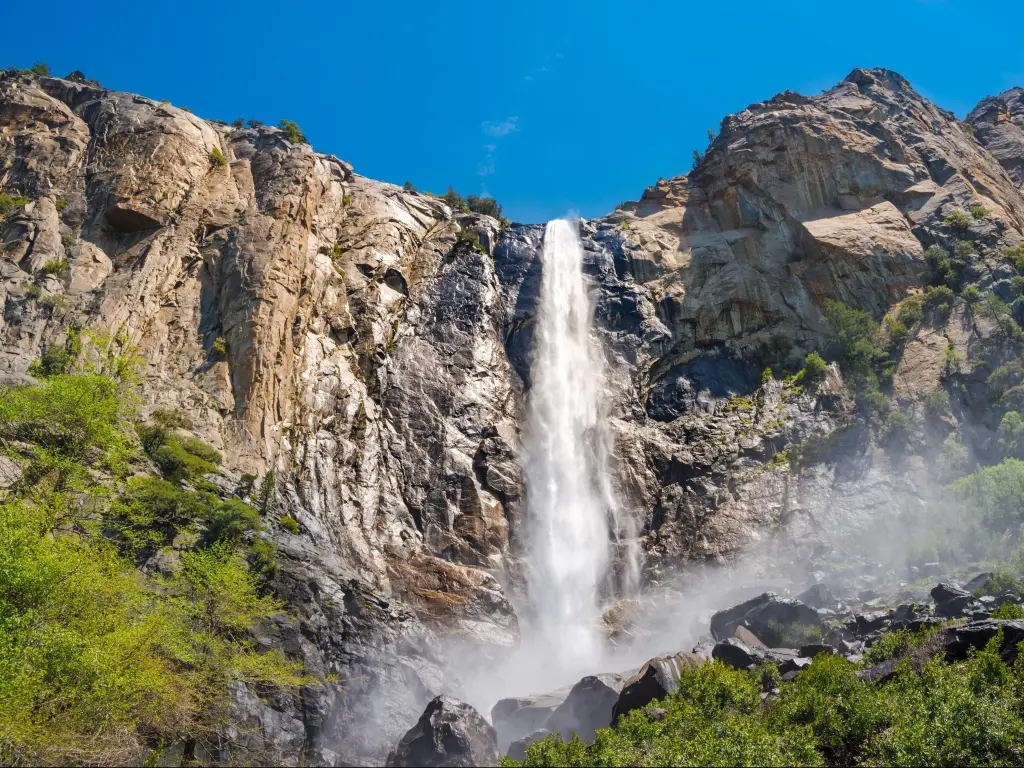
How to get there: Enter at the Arch Rock Entrance Station then follow El Portal Road and take a right turn onto Southside Drive after 5.5 miles. After 1 mile take a slight right onto Wawona Road and use the parking on the left.
Best time to visit: In late afternoon or early evening, the position of the sun creates a rainbow from the mist of Bridalveil Falls.
For the most spectacular pictures, you'll want to head here in spring or early summer, when snowmelt is at its peak. There will be a better flow to the fall, plus clear skies at this time of year mean the sunlight hits the mist to make rainbows.
Where to park: Off Wawona Road, there's a signposted parking lot for Bridalveil Falls. From the parking lot, you can access the Bridalveil Fall Trail for a short hike to the falls.
5. Tenaya Lake
What makes this photo spot special: The crystal clear Tenaya Lake is nestled beneath towering granite peaks. The still water is so clear that you can capture the lakebed as well as the reflection of the stunning surroundings.

How to get there: Enter at the Tioga Pass Entrance, then enjoy the drive along Tioga Road, through the high elevations of Yosemite. After around 14 miles, you will reach Tenaya Lake.
Best time to visit: The soft morning light makes it easier to capture reflections off the clear waters.
In spring and summer, the lake has lush green surroundings thanks to the snowmelt, while in fall you can capture the red and orange hues of the foliage around the lake. However, keep in mind that Tioga Pass Entrance and Tioga Road are closed through the winter.
Where to park: There are parking spots along Tioga Road next to the lake, including picnic areas and toilet facilities.
6. Half Dome
What makes this photo spot special: As its name suggests, this impressive 5,000-foot peak gives the impression that it's the remains of a full dome that has been split in half.
It's a popular albeit challenging hike to the summit. You'll enjoy a spectacular view if you get to the top, but you'll need to apply for a permit. Read up on the conditions as the long ascent, which includes a section of rock-face cables, isn't everyone's idea of fun.

How to get there: Half Dome is commonly photographed from Glacier Point, which you've already read about. For a quieter alternative, head to Washburn Point to take in the view.
You can reach Washburn Point via the South Entrance, driving for 17 miles along Wawona Road until you reach the turn onto Glacier Point Road. Continue right to the end, where the road loops around.
Best time to visit: In the early evening, red sunset hues create a distinct backdrop to the Half Dome.
You won't be able to drive up here when Glacier Point Road is closed in winter, although it's possible to ski up if you're feeling active.
Where to park: Use the Washburn Point parking lot off the right-hand side of Glacier Point Road for a quieter way to photograph Half Dome.
7. Yosemite Falls
What makes this photo spot special: Yosemite Falls holds the crown for the tallest waterfall not only in the USA but all of North America. It comprises three falls, Upper Yosemite Fall, Middle Cascades, and Lower Yosemite Fall, with a combined height of 2,425 feet.

How to get there: Enter at the South Entrance and continue on Wawona Road until you pass through the Wawona Tunnel and merge onto Southside Drive. Take a left turn onto Sentinel Drive to cross the Merced River and after just 0.3 miles, turn left onto Northside Drive, where you can park to see the falls.
Best time to visit: The afternoon sunlight makes the falls glisten, while a blue sky can create a picturesque backdrop.
This part of Yosemite is accessible all year round, and unlike other waterfalls in the area it flows right through the winter. That said, the falls are most powerful in spring and summer through the help of snowmelt.
Where to park: Use the Yosemite Falls parking on Northside Drive where you can access the trailheads to the falls.
8. Tuolumne Meadows
What makes this photo spot special: Tuolumne Meadows is the ideal spot to experience the high elevations of the Sierra Nevada Mountains. These alpine meadows, with their tranquil streams and granite rocks, are much less crowded than other regions of the park.

How to get there: Enter at the Tioga Pass Entrance and continue for around 7 miles on Tioga Road until you cross the bridge over the Tuolumne River. Soon after you'll reach the Tuolumne Meadows Visitor Center where you can pause to enjoy this part of the national park.
Best time to visit: Visiting in early morning or late afternoon avoids the harsh midday sunlight, and also increases your chance of photographing wildlife that prefers to roam in the cooler parts of the day.
In summer the meadows are lush and green, while the quieter fall months mean you'll have fewer obstacles getting in the way of your photography.
However, due to snow, this part of Yosemite is inaccessible in winter unless you're into cross-country skiing.
Where to park: Use the Tuolumne Meadows Visitor Center parking on Tioga Road.
9. Taft Point
What makes this photo spot special: Taft Point is famous for its viewpoint, where you can perch on the end of a dramatic vertical drop. Or peer down through the fissures in the rocks for another interesting perspective on Yosemite.

How to get there: Follow Wawona Road from the South Entrance of Yosemite then take a right turn onto Glacier Point Road. After another 14 miles, there's a small parking lot on the side of Glacier Point Road, from where you can access the trailhead.
Best time to visit: This viewpoint is famed for its sunset views. The sun dropping below the horizon creates a dramatic yet peaceful experience and photo.
Note that, as this viewpoint is on Glacier Point Road, you won't be able to drive here in winter.
Where to park: There's a small parking lot on the side of the road from where you can access the Taft Point Trailhead.
10. Valley View
What makes this photo spot special: This is another popular photography spot where you can attempt to capture the reflection of El Capitan in the serene reflective waters of the Merced River.

How to get there: Enter at the Arch Rock Entrance on Central Yosemite Highway, then drive on El Portal Road for 5.5 miles before turning onto Southside Drive.
Join the one-way system by turning left onto El Capitan Road, then merge onto Northside Drive and use the roadside parking around 2 miles later.
Best time to visit: This is a magical place to photograph in the early morning, when the sun is reflected in the river and your pictures will be bathed in a beautiful light.
For an intense set of photos, head here in the spring when the Merced River is in full flow thanks to the snowmelt.
Where to park: Pull up in the roadside parking area along Northside Drive.
11. Yosemite Chapel
What makes this photo spot special: Dating from the 19th century, Yosemite Chapel gives you the chance to shoot the history of the national park.
The rustic chapel has a bell tower and is one of the oldest buildings in the park. With its backdrop of cliffs and pine trees, you can capture quaint and contrasting views here.

How to get there: Yosemite Chapel is accessible via the South or Arch Rock Entrance, depending on where you're visiting from.
From Arch Rock Entrance, continue on El Portal Road for 5.5 miles before taking a left onto Southside Drive. Another 5 miles further on, take a right turn to reach the chapel.
Best time to visit: You might not think that a man-made object like the chapel would change much throughout the day, but the soft light offered by the golden hours of sunrise and sunset make the cliff and pine backdrop here appear warmer.
In theory, you can photograph Yosemite Chapel all year round. Winter creates a unique photo with snow lying around the chapel, however, access may be limited at times as a result.
Where to park: Use the parking lot just off Southside Drive.
12. Nevada and Vernal Falls
What makes this photo spot special: While not as high as the impressive Yosemite Falls, you'll still be able to capture amazing photographs at Nevada Falls and Vernal Falls.
Powerful Nevada Falls cascades 594 feet down the granite mountainside, while at Vernal Falls, which is slightly smaller at 317 feet, you'll find a spectacular vertical drop.
These waterfalls sit on two hiking trails that offer multiple viewpoints on the ascent and at the top of the falls - perfect for maximizing your photo opportunities.

How to get there: Entering at the Arch Rock Entrance, continue on El Portal Road and turn right after 5.5 miles onto Southside Drive. After 6 miles, join the Happy Isles Loop Road and use the Yosemite Valley Trailhead Parking on the right.
You'll have to hike to reach the falls, with the option of taking the aptly named Mist Trail or the John Muir Trail. Both routes take you right to the top of the falls and feature some fairly strenuous sections.
If you'd rather skip the challenging hike, you can also get beautiful views of Vernal Fall from the footbridge which is under a mile along the trail. This section is paved too, making it an easier walk than the slippery later sections which cross the granite in the splash zone.
Best time to visit: Visit the falls in the morning or afternoon since the midday light can often be too harsh on the water.
Thanks to snowmelt you can get impressive views of the cascading water in the spring, but take extra care on the hike as the path is more likely to be wet and slippery at this time of year. There's also a high chance of getting wet, so watch out for your camera!
Where to park: While parking is available at Yosemite Valley Trailhead Parking, you can't get to the falls without hiking, as we've mentioned above.
13. Sentinel Bridge
What makes this photo spot special: The Sentinel Bridge allows you to position yourself in the middle of the Merced River, placing it in the foreground and capturing reflections of the Half Dome in the water below.

How to get there: From Yosemite's Arch Rock Entrance, take the right turn onto Southside Drive after 5.5 miles on El Portal Drive. Stay on Southside Drive for another 5 miles before turning left over the Sentinel Bridge.
Best time to visit: Soft and warm light in the evening and early morning are best for capturing reflections in the Merced River.
In spring and summer the lush greenery and wildflowers will add an extra layer of color to the already picturesque shot.
Where to park: You'll find a parking area on the left just after the road crosses Sentinel Bridge.
14. Inspiration Point
What makes this photo spot special: You'll have to hike to reach the viewpoint at Inspiration Point, but once you're there, you'll be rewarded with panoramic views of the valley from an elevated vantage point.

How to get there: Enter Yosemite at the South Entrance and drive on the Wawona Road until you reach the Wawona Tunnel. Straight after leaving the tunnel, you'll reach a parking lot on the right, which you can use to access the trailhead.
Best time to visit: Unlike most of our other recommended photo stops, Inspiration Point is one where the midday light usually helps rather than hinders your photography, making for some dramatic effects and meaning you can complete the return hike long before it gets dark.
The only exception is if you're traveling in the height of summer when the hike will feel more challenging in the hottest part of the day. Spring is a much cooler time of year to visit, and the meadow scenery along the way is often much more vibrant.
Where to park: It's not possible to drive right up to Inspiration Point. Instead, park just after the Wawona Tunnel then follow the Ponoho Trail which is a 2.6-mile round trip.
15. Cook's Meadow
What makes this photo spot special: Spring wildflowers mean that Cook's Meadow is a picturesque foreground for your photographs of the Yosemite landscape. In one photo, you can capture the meadow, prominent granite cliffs, and the Merced River.
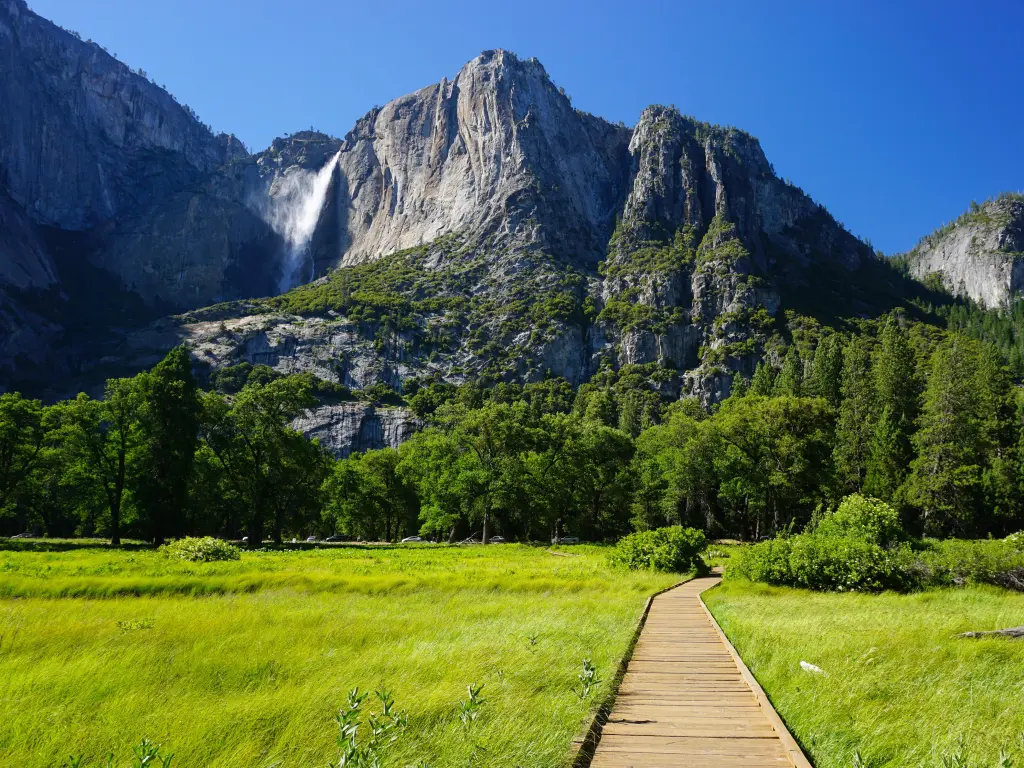
How to get there: Enter at the South Entrance and follow Wawona Road until it merges onto Southside Drive. After around 5 miles on Southside Drive, take a left onto Sentinel Drive crossing the Sentinel Bridge and use the parking lot just after crossing the bridge.
Best time to visit: As we've mentioned, the spring offers the contrasts of vibrant greens and wildflowers, but you can also get a beautiful shot here in winter.
Frosty mornings offer up a serene setting for photos, and as the park tends to be much quieter, you're likely to have fewer obstructions as you compose the perfect picture.
Where to park: Use the Sentinel Bridge parking, from where you can access the Cook's Meadow Loop. The trail is open year-round and is just a 1 mile loop.
16. Clouds Rest
What makes this photo spot special: Clouds Rest is one of Yosemite's highest granite peaks, offering 360-degree views of the park. Because it's a long and challenging hike, it's often very quiet and makes for an intimate photography spot.

How to get there: Enter at Tioga Pass then travel along Tioga Road for 16 miles. Park after Tenaya Lake then follow the Sunrise Lakes Trailhead.
It's a challenging round-trip route that comes in at around 14.5 miles and includes significant uphill stretches, so before setting out, check for local advice to make sure you're prepared for the hike.
Best time to visit: Sunrise and sunset show the landscape in a beautiful soft light, but you'll need to factor in the 6-hour hike, so this isn't a photo stop for the novice hiker.
The trail becomes impassable during the winter months because of snow.
Where to park: Use the small parking lot after Tenaya Lake to access the hike up to Clouds Rest.
17. Eagle Peak
What makes this photo spot special: Looking out across Yosemite Valley, naturalist John Muir called Eagle Peak the "most comprehensive of all the views." He had a point - the birds-eye view here looks out across the Sierra Nevada from a high vantage point.
It's also quieter than some other viewpoints in Yosemite, thanks to its distance from the road.

How to get there: Entering at the Arch Rock Entrance, continue on El Portal Road before turning onto Southside Drive. Take a left turn over Sentinel Bridge then turn onto Northside Drive. We recommend stopping at the ample parking lot for Yosemite Falls.
From the parking lot, take the Upper Yosemite Falls Trail and continue on past the falls on the 6- or 12-mile round trip to Eagle Peak.
Best time to visit: Time your visit around the hike - if you're taking in the viewpoint in the afternoon, make sure you have long enough to get back to the parking lot before dark.
Where to park: Use the Yosemite Falls Parking.
18. Mirror Lake
What makes this photo spot special: As its name suggests, Mirror Lake is usually calm and clear, making it the ideal place to capture reflections of the stunning Yosemite landscape. Tenaya Canyon makes the perfect backdrop to your photos here.

How to get there: Use Yosemite's Arch Rock Entrance, then follow El Portal Road before taking a right onto Southside Drive after around 5.5 miles. After a further 6 miles, continue onto Happy Isles Loop Road until you reach the start of the Mirror Lake Trail.
Best time to visit: The softer light in the morning and late afternoon makes for ideal conditions to capture reflections.
In late May and early June, the water level is also higher, so it can be easier to get a snap of the iconic mirror-like reflections.
Where to park: Use the parking on Happy Isles Loop Road to access the Mirror Lake Trailhead. It's a 2-mile round-trip hike to get to the lake and back.
19. Olmstead Point
What makes this photo spot special: Just off Tioga Road, Olmsted Point Overlook is a great place to capture views over the granite slopes, including looking up towards Cloud Rest. It's a scenic alpine landscape at high elevation, but unlike many other outlooks, this one is much more accessible.

How to get there: Enter Yosemite at the Tioga Pass Entrance and continue along Tioga Road, passing Tenaya Lake on your left. After 17 miles, look out for the signposted turnout on your left.
Best time to visit: The easy access to Olmsted Point means you can get there for sunrise and wait in the parking lot for the perfect light.
Each season has its own charm here, but remember you won't be able to drive along Tioga Road during the winter closure.
Where to park: Olmsted Point has its own overlook parking off Tioga Road.
20. Mariposa Grove
What makes this photo spot special: Mariposa Grove is home to some of the world's largest trees, in fact there are more than 500 giant sequoias here. The Grizzly Giant is perhaps the most famous, estimated to be 3,000 years old.

How to get there: Use the South Entrance Station, and you will reach Mariposa Grove almost immediately. Pick up Mariposa Grove Road just after entering the park and continue to the end of the road where you'll find parking.
Best time to visit: The giant trees offer cover from the sun so you can capture great pictures any time of the day. Don't let rainfall put you off here, since gray and rainy days work great for forest photographs.
The trees will be at their greenest in the spring, and offer up a spectacular scene if you're lucky enough to capture rays of sunlight piercing the high canopy.
Where to park: Use the parking area at the end of Mariposa Grove Road then pick up one of the trails through the forest.
Big Trees Loop is the shortest route at under half a mile, while the 2-mile Grizzly Giant Loop takes you to the 3,000-year-old Grizzly Giant sequoia.
If you're looking for a longer hike, Guardians Loop is a 6.5-mile circuit that takes you through the Wawona Tree Tunnel. The most strenuous option is the Mariposa Grove Trail, which features notable elevation gains on the way to Wawona Point.

